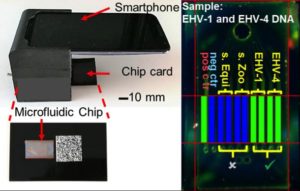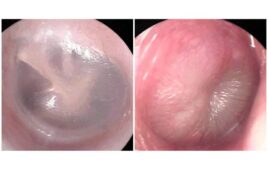
[Image from Micro & Nanotechnology Laboratory, University of Illinois at Urbana-Champaign]
Researchers from the University of Illinois at Urbana-Champaign and the University of Washington at Tacoma developed a device that diagnoses infectious diseases at the point-of-care. The devices uses a smartphone as the detection instrument with a test kit that is in the format of a credit card.
So far, the researchers have been able to use the device to detect and quantify the presence of Zika virus, Dengue and Chikungunya virus in a single droplet of blood. They were also able to detect respiratory diseases in horses.
The device is low-cost, portable and uses a smartphone, making point-of-care diagnostics more accessible. It is able to test for the presence of more than one pathogen through a single test, also increasing its affordability.
A 3D printed cradle holds the optical and electrical components and connects with the camera on the back of the smartphone.
It can connected to any commercial smartphone to gather and interpret real-time images of enzymatic amplification reactions that happen in the microfluidic chip. The chip also creates a green fluorescence that can display a visual read-out of the test.
The software on the device gathers information from the test on the microfluidic card and information about a specific patient. The results of the tests are then sent to a cloud-based database.
“This project is a game changer,” said David Nash, one of the researchers on the project, in a press release. “This is the future of medicine-empowered frontline healthcare professional. We can’t stop viruses and bacteria, but we can diagnose more quickly. We were able to demonstrate the clear benefit to humankind, as well as to animals, during the proposal phase of the project and our results have proved our premise. Next, I want to go into the field, multiple sites, multiple geographic locations and test in real-world situations.”
There are currently 42,613 Zika virus cases in the U.S. as of Oct. 18, according to the CDC. The World Health Organization also reports that 47 countries have reported having a first outbreak of Zika virus since 2015, most of which being transmitted by mosquitoes.
Developers of the device suggest that using an animal model to test the device can make it easier to develop diagnostic tools.
“You can often more easily develop diagnostic tools for human use by coming in to development from the animal side of things first. Many diseases show up first in animals, kind of the canary in the coal mine,” Nash said.
The researchers suggest that the technology is designed to help clinicians quickly diagnose diseases in their office or in the field to create more informed patient management decisions and improve how disease outbreaks are controlled.
The research was published online in the journal Biomedical Microdevices.




